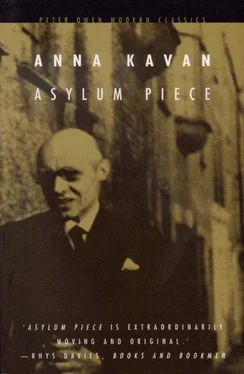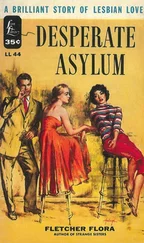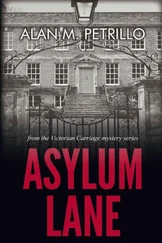I watched in astonishment, half believing myself the victim of a hallucination, expecting that next moment the birds would vanish away and leave the garden unilluminated as before. But still they remained, not approaching the food which I had thrown out of the window nor mingling with the other birds — now, by contrast, so drab and uninspired looking — but keeping to the straggly bare boughs of the prunus, sometimes flirting their wings as in an impish fan dance, sometimes comporting themselves with a mimic dignity, like cadets from the school of pages.
Enchanted by the vision, I was about to make an appreciative comment aloud, when something made me glance at the servant who was still standing behind me. Although she too was looking out into the garden, the good woman’s face expressed no particular interest, and it was clear to me that she did not see the two bright birds which were causing me such emotion.
What conclusion was I to draw from this? It seemed incredible than anyone could fail to observe those twin spots of colour, more striking than jewels on the grey January background. No, I could only presume that the birds were visible to me alone. That is the conclusion to which I have held ever since: for my ethereal visitors have not deserted me. It is true that several times in the day they will disappear, but always to return after a few hours, so that looking up from my papers I will suddenly be re-enheartened by the sight of their incongruous brightness in the midst of the dreary scene. Is this a good sign? I can almost bring myself to believe that it is; that an omen has been vouchsafed to me indicating that my troubles are nearlyover andthat things are at last going to take a more favourable turn.
Or am I just being superstitious, like an unlucky gambler who sees fate in the fall of a chip and symbols even in the patterns of the wall-paper?
Yesterday I went to see my official advisor. I have visited him fairly often during the last three months in spite of the inconvenience and expense of these interviews. When one’s affairs are in such a desperate state as mine, one is simply obliged to make use of any possible help; and this man D has been my last hope. He has been the only source of advice and assistance available to me, the only person with whom I could discuss my affairs: in fact, the only person to whom I could speak openly about the intolerable situation in which I have been placed. With everybody else I have had to be reserved and suspicious, remembering the motto, ‘Silence is a friend that never betrays anyone’. For how can I tell whether the person to whom I am talking is not an enemy, or perhaps connected with my accusers or with those who will ultimately decide my fate?
Even with D I have always been on my guard. From the start there have been days when something seemed to warn me that he was not altogether to be trusted: yet on other occasions he filled me with confidence; and what was to become of me if I were deprived even of his support — unsatisfactory as it might be? No, I really couldn’t face the future entirely alone, and so, for my own sake, I must not distrust him.
I went to him confidently enough in the first place. His name was known to me as that of a man, still young, but already very near the top of his profession. I considered myself lucky to have been placed in his charge, notwithstanding the long journey which separated me from him: in those early days I did not anticipate having to visit him frequently. At the beginning, I was favourably impressed by his solid town house, and by the room in which he received me with its wine-coloured velvet curtains, its comfortable arm-chairs, its valuable looking pieces of tapestry.
About the man himself I was not so certain. I have always believed that people of similar physical characteristics fall into corresponding mental groups, and he belonged to a type which I have constantly found unsympathetic. All the same, there could be no doubt as to his ability, he was excellently qualified to take charge of my case, and as I was only to meet him occasionally — and then in a professional and not in a social capacity — the fact of our being basically antipathetic to one another seemed of little significance. The main thing was that he should devote sufficient time to my affairs, that he should study my interests seriously; and this, to begin with, he seemed quite prepared to do.
It was only later, as things went from bad to worse, and I was obliged to consult him at shorter and shorter intervals, that I started to feel dubious about his goodwill towards me.
At our early meetings he always treated me with extreme consideration, even with deference, listening with the closest attention to everything I had to say, and in general impressing me with the grave importance of my case. Irrational as it may sound, it was this very attitude of his — originally so gratifying — which aroused my first vague suspicions. If he were really looking after my interests as thoroughly as he asserted, why was it necessary for him to behave in this almost propitiatory way which suggested either that he was trying to distract my attention from some possible negligence on his part, or that matters were not progressing as favourably as he affirmed? Yet, as I have previously mentioned, he had a knack of inspiring confidence, and with a few encouraging, convincing phrases he could dispel all my tenuous doubts and fears.
But presently another cause for suspicion pricked my uneasy mind. Ever since my introduction to D I had been aware of something dimly familiar about his face with the very black brows accentuating deep-set eyes into which I never looked long enough or directly enough to determine their colour but which I assumed to be dark brown. From time to time my thoughts idly pursued the half-remembered image which I could never quite manage to bring into full consciousness. Without ever really giving much attention to the subject, I think I finally decided that D must remind me of some portrait seen long before in a gallery, most probably somewhere abroad; for his countenance was decidedly foreign, and contained the curious balance of latent sensuality and dominant intellectualism seen to the best advantage in some of the work of El Greco. Then one day, just as I was leaving his house, the complete memory which had eluded me for so long, suddenly came to me with an impact sharp as a collision with a fellow pedestrian. It was no ancient portrait that D’s face recalled to my mind, but a press photograph, and one that I had seen comparatively recently, one that was contained in an illustrated periodical which was probably still lying about somewhere in my living-room.
As soon as I got home I started to search through the papers which, in my preoccupied state of mind, I had allowed to accumulate in an untidy pile. It was not long before I found what I was looking for. The face of the young assassin, gazing darkly at me from the page, was, in all essentials, the same black-browed face that had confronted me a short time previously in the curtained seclusion of his handsome room.
Why did this accidental likeness make such an impression on me, I wonder? It is possible for a man to resemble a certain murderer in his outward appearance without possessing himself any violent tendencies; or if, as is more likely, he does possess them, without lacking sufficient restraint to hold them in check. One has only to think of D’s responsible position, to look at his controlled, serene, intelligent face, to realize the fantastic nature of the comparison. The whole sequence of ideas is utterly grotesque, utterly illogical. And yet there it is; I can’t banish it from my mind.
One must remember, too, that the man in the photograph was no common assassin, but a fanatic, a man of extraordinarily strong convictions, who killed not for personal gain, but for a principle, for what he considered to be the right. Is this an argument against D or in his favour? Sometimes I think one way, sometimes the other: I am quite unable to decide.
Читать дальше












